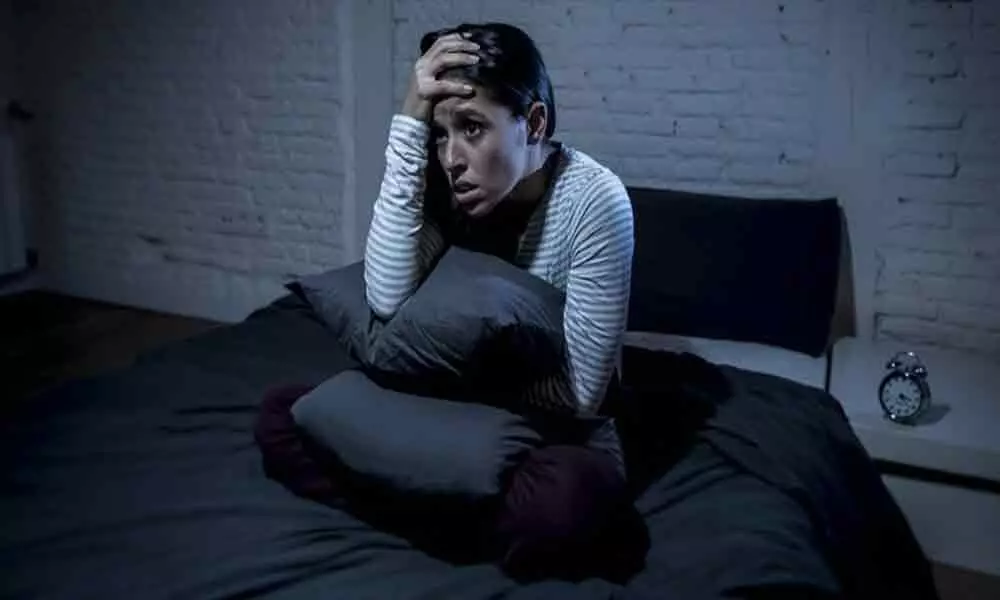Live
- They always want me to win, and now I feel lucky to have been offered a story like ‘Zebra’: Satyadev Kancharana
- ‘Democracy first, humanity first’: PM Modi in Guyana's parliament on two countries' similarities
- PKL Season 11: Telugu Titans register third straight win to top standings
- Is Pollution Contributing to Your COPD?
- NASA Unveils Underwater Robots for Exploring Jupiter's Moons
- Additional Central forces arrive in violence-hit Manipur
- AR Rahman and Saira Banu’s Divorce: Legal Insights into Common Issues in Bollywood Marriages
- 82.7 pc work completed in HPCL Rajasthan Refinery area: official
- Curfew relaxation extended in 5 Manipur districts on Friday
- Tab scam prompts Bengal govt to adopt caution over fund disbursement
Just In
Nightmares might be a sign of mental health issues or neurological issues


Nightmares (Representational Purpose Only)
Teeth falling out? Lost in the wilderness alone? Being chased but can’t scream? When you suddenly wake up frightened from such disturbing nightmares, it can cause you significant distress and discomfort.
From sensing all too real to playing on our deepest fears, bad dreams can make it harder to get back to sleep and lead to bedtime anxiety. You might think you are the only one experiencing it but almost everybody has nightmares from time to time. These nightmares might be interrupting your sleep on a regular basis? If so, it's important to determine what's causing you nightmares.
Both children and adults experience nightmares and bad dreams even though they are mainly related with childhood. A nightmare is a disturbing dream with negative feelings like anxiety or fear that awakens you. The nightmares occur during the rapid eye movement (REM) stages of sleep which often represent the individual in a situation that risks their life or personal safety, usually. Though most people have experienced at least one nightmare during their life, people with nightmare disorder experience them with a greater and regular frequency.
You are more likely to have a nightmare in the second half of night. Episodes are generally brief but they awaken you from sleep and getting back to sleep can be difficult.
The topics of nightmares can differ from person to person. There are some common nightmares that many people experience, for example, adults might have nightmares about not being able to run fast enough to escape danger or about falling from a great height. Sometimes nightmares usually have themes related to the day's events.
If you have gone through a traumatic event such as an attack or accident, you may have recurrent nightmares about your experience.
Dr Sabina Rao, Consultant Psychiatry, Columbia Asia Hospital Sarjapur Road said, "Nightmares are common in people who have post-traumatic stress disorder, anxiety or depression. Some medications could also contribute to nightmare frequency. Medications such as antidepressants, blood pressure medications can trigger nightmares. Withdrawal from medications and substances including alcohol, narcotics may also trigger nightmares. For few people reading scary books or watching horror movies especially before bed can be associated with nightmares. Sleep deprivation can also contribute to nightmares."
Reduce your nightmare frequency
Engaging in regular exercise may help alleviate nightmare-causing anxiety and stress. Yoga, meditation and deep breathing can be helpful. Reducing the number of cups of caffeine, reducing or stopping the consumption of alcohol, and cutting out cigarette consumption are some of the ways to improve sleep and enhance the quality of sleep.
Practicing good sleep hygiene may help in preventing the sleep deprivation that causes nightmares. Sleeping at the same time every day, waking up at the same time every day, avoiding afternoon naps are some of the ways one can improve the quality of sleep.
Avoiding gadgets after 8 pm, avoiding watching movies with themes of horror or destruction/ death, avoiding staying on the phone, laptop might help alleviate nightmares.
Nightmares can sometimes become more than just occasional disruptions, causing significant sources of sleep anxiety. If you feel like nightmares are making it difficult to get a good sleep or feel anxiety around falling asleep due to bad dreams, it is worthwhile discussing it with your doctor or a psychologist. Additionally, Psychiatrists and Neurologists are trained to help understand and treat the underlying cause for sleep disruption due to nightmares.

© 2024 Hyderabad Media House Limited/The Hans India. All rights reserved. Powered by hocalwire.com






